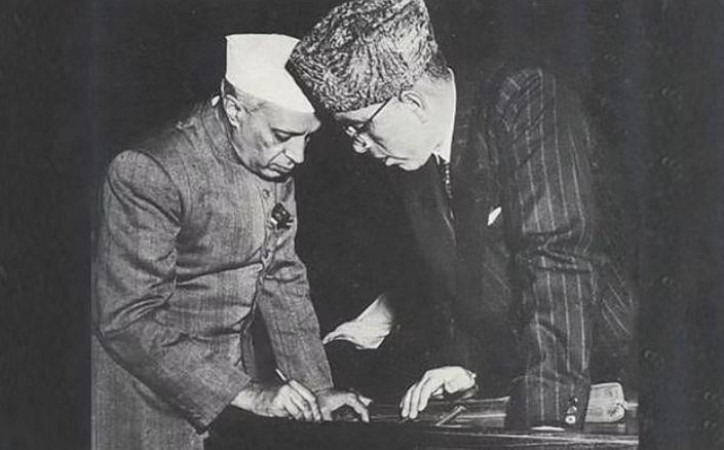
Srinagar: The history of Jammu & Kashmir reveals a troubling legacy linked to the friendship between Jawaharlal Nehru and Sheikh Abdullah. Their alliance, which significantly shaped the early years of the state, is often cited as a contributing factor to the region's descent into terrorism, corruption, and dynastic politics. The controversial implementation of Article 370 and Article 35A, alongside the enduring influence of the Abdullah and Nehru families, has had lasting repercussions, including the rise of terrorism.
The Roots of Conflict: Nehru and Abdullah's Policies
Jawaharlal Nehru's support for Sheikh Abdullah, who was seen as a proponent of secularism and socialism, played a pivotal role in Abdullah's rise to power in Kashmir. This support, however, came at the cost of sidelining the legitimate ruler, Maharaja Hari Singh. The Instrument of Accession signed by Hari Singh in 1947 was intended to integrate Kashmir into India while granting it autonomy. However, Nehru's insistence on Article 370 created a legal barrier between Kashmir and the rest of the country. This special status allowed Sheikh Abdullah to maintain political dominance, using Article 370 and Article 35A to consolidate his control over Kashmir.
Corruption and Dynastic Politics: The Dark Side of Autonomy
Article 370 granted Kashmir significant autonomy, which, instead of fostering development, led to rampant corruption and nepotism. Abdullah's National Conference (NC) turned governance into a family affair, laying the groundwork for dynastic politics. This environment of corruption and political favoritism created fertile ground for unrest and dissatisfaction among the population.
The Praja Parishad movement, which emerged in the early 1950s, opposed Article 370 and sought full integration of Kashmir with India. The movement highlighted the growing discontent with Abdullah's rule and the misuse of Article 370 to shield his autocratic governance. Nehru's decision to side with Abdullah and reject the Praja Parishad's candidates further entrenched the perception that the Nehru-Abdullah alliance was prioritizing personal friendships over the welfare of the state.
Article 370 and the Rise of Terrorism
The implementation of Article 370 and Article 35A not only created a constitutional divide but also exacerbated issues of governance and corruption in Kashmir. These provisions allowed Jammu and Kashmir to have its own Constitution and flag, which, rather than promoting progress, prioritized the interests of the Abdullah and Nehru families. This setup fostered an environment where political power was inherited rather than earned through democratic processes.
The lack of accountability and widespread corruption under the Nehru-Abdullah regime contributed to the rise of terrorism in Kashmir. The insurgency that began in the 1990s was fueled not only by external influences such as Pakistan but also by decades of mismanagement and political instability rooted in the policies of Nehru and Abdullah. The insurgency, which resulted in numerous casualties and suffering, is a direct consequence of the flawed policies of the past.
A Turning Point: Abrogation of Article 370
The abrogation of Article 370 and Article 35A by the Narendra Modi Government on August 5, 2019, marked a critical shift in Kashmir's trajectory. This decision aimed to fully integrate Jammu and Kashmir into the Indian Constitution and was seen as a move towards addressing the long-standing issues of corruption and separatism. The removal of special status opened the door for reforms, including anti-corruption measures and infrastructure development, contributing to a reduction in terrorist activities and an improvement in regional stability.
The Threat of a Return to the Old Order
The recent alliance between Rahul Gandhi’s Congress and Omar Abdullah’s National Conference has raised concerns about a potential rollback of these reforms. The National Conference’s promise to restore Article 370 and 35A, if it returns to power, threatens to undo the progress made since their abrogation. This alliance, seen by many as a revival of the Nehru-Abdullah legacy, could potentially reignite corruption and separatist sentiments in Kashmir.
As Jammu and Kashmir stand at a crossroads, the potential for a new era of peace and development hinges on learning from past mistakes. The lessons of the Nehru-Abdullah era must not be forgotten as the region navigates its future, ensuring that the mistakes of the past do not repeat and that the progress achieved is safeguarded.
Jharkhand High Court Orders Immediate Response on Tribal Conversion Claims
India Boosts Border Infrastructure with Key Projects on China and Pakistan Fronts